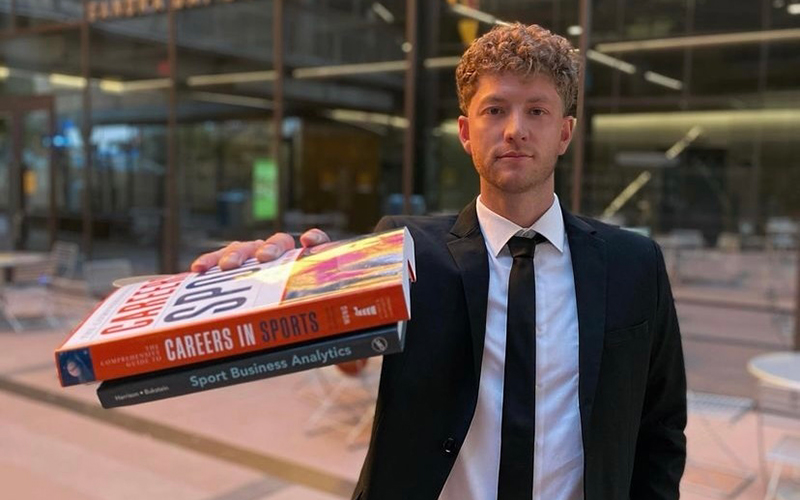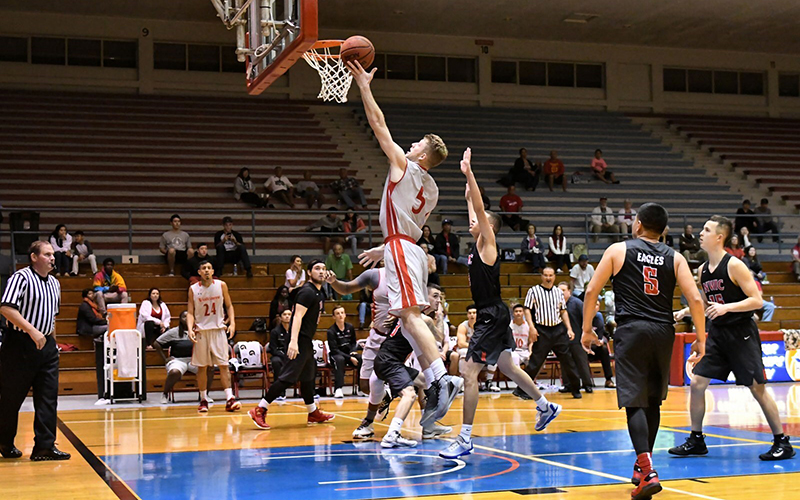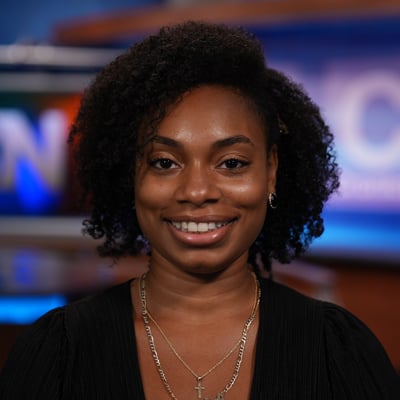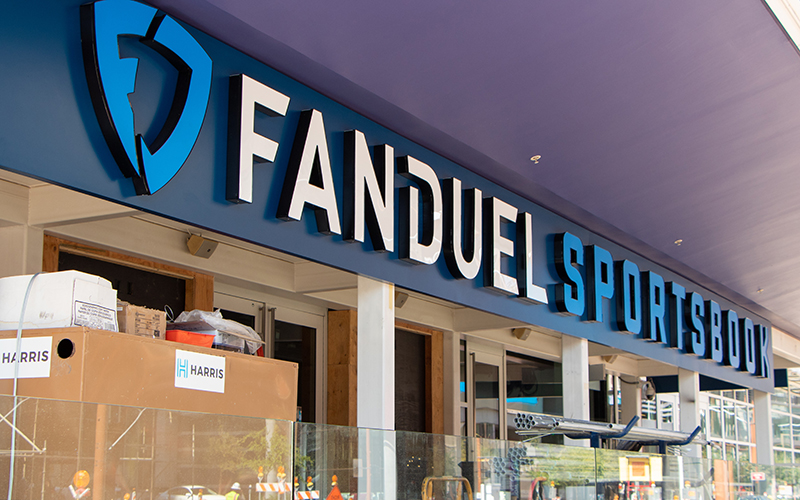
In addition to working at FanDuel, Parker Farris is enrolled in Arizona State’s Sports Law and Business program. (Photo courtesy of the Farris family)
PHOENIX – From Hawaii to Bogota to Phoenix’s Footprint Center, Parker Farris has experienced sports from a variety of perspectives.
These days it’s a close-up look at how Arizona is responding to legislation that made sports gambling legal on Sept. 9.
“It’s been fun seeing everything built from the ground up here from the perspective of a big corporate company,” said Farris, who works as a sports book supervisor at Footprint Center for FanDuel. “Working at the sports book has taught me a lot already about the industry, and since sports betting is so booming, there are a lot of opportunities to continue to grow even further.”
Arizona could generate more than $3 billion in annual wagers and $200 million in annual gross gaming revenue, according to a study by PlayAZ.com, which analyzes and researches the state’s regulated online gaming and sports betting market.
Farris brings a unique perspective to the start of the NBA season as well as the launch of sports gambling.
After playing four years of Division II college basketball at Hawaii Hilo, he thought he was done playing the game forever. He entered the workforce, then enrolled in the the Allan “Bud” Selig Sports Law and Business program at the Sandra Day O’Connor College of Law at Arizona State University
“I was tired of playing basketball, but then I missed it,” Farris said. “So I quit my job, moved to Seattle to train for eight months and then moved here for law school.”
Then his phone rang.
When Farris answered 2 ½ years ago, it was the call of a lifetime from the Bogota (Colombia) Pirates, who offered Farris an opportunity to play professional basketball.
The Pirates wanted to know if he was still in shape and whether he could still play basketball.
“I said, ‘Yeah let’s do it,’” Farris said.

After Parker Farris played basketball at the University of Hawaii at Hilo, he also competed professionally in Bogota, Colombia. (Photo courtesy of Hawaii Hilo Athletics)
Farris, who was in his first semester at ASU, got himself in tip-top shape in just three weeks while also managing his school requirements. Then he was off for Bogota, a city of more than 7.7 million people in central Colombia.
During the 2020 season with the Pirates, the 6-foot-5 guard averaged 16 points a game while balancing two-a-day workouts for hoops and all-day Zoom sessions for school – all while living on another continent. It was a challenge, but he tried to stay ahead by completing homework before it was due.
“It’s late nights and early mornings,” Farris said. “For a pro, it’s definitely two workouts a day. I don’t feel comfortable unless I’m doing two a day. So I did that and stayed on top of my homework. It’s definitely hard to balance both.”
Aaron Hernandez, the director of the Selig Sports Law and Business program at ASU Law, believes there are some common themes you find among athletes that make them ripe for success in the real world.
“They work extremely hard, they’re used to managing their time, balancing multiple priorities, and they have competitive drive,” Hernandez said. “If they come from a team sport like Parker, they also know how to deal with conflict.”
Hernandez tried to support Farris in any way possible, academically.
“There were some adjustments that we had to make on our end to help him achieve his dream of playing professional basketball,” Hernandez said. “I encourage him as much as I can. We certainly celebrated his accomplishments, and we’re extremely proud of him. I can’t say enough how tough it is to make that adjustment and be successful in both worlds, which he was.”
Farris signed with another club, the Bucaramanga Bucaros, in Colombia and started in all 11 games during the 2021 spring season for the team. However, he decided not to return to Colombia when the Bucaros began their fall season in September.
Instead, he’s concentrating on his degree and his duties with FanDuel, where he’s never too far away from the game he loves while working in an NBA arena.
His sister, McKenna Farris, described him as “motivated.”
“Basketball is such a big part of his life,” McKenna. “I know he doesn’t just do it for fun, but he thinks of it as a career.”
Farris started playing basketball at a young age, beginning in recreational leagues in the second grade.
“Basketball is the pathway for my life, in business, relationships, in my day-to-day,” Farris said. “The game itself means a lot to me. I could probably get by without it, but I am a lot happier with it.”
McKenna said that going pro meant “everything to him.”
“He knows where he wants to go and sets and meets his goals to get there,” she said. “He looks to the future and I always looked up to him for that.”
That future no longer includes playing professionally. Still, Farris doesn’t regret the time he spent in Colombia, even though his international travels meant overcoming a language barrier, loneliness and the lack of his support system around him.
“Last season, I was one of four white guys out of 10 teams, so I definitely stood out,” Farris said. “There was a lot of FaceTime (with family), but you do get lonely. It’s fun on paper . . . But I was in a bubble.”
Due to COVID-19, Farris endured many obstacles last season, and being in a “bubble” was just one of them. Often, he had to keep his mind occupied before he became “stir crazy.”
“It felt like jail at first when I was there,” Farris said. “But you just have to talk with your loved ones and eventually you get used to it.”
While he is no longer trying to juggle playing professionally while pursuing an education and a sports business career, Farris is never too far from the game that made all of it possible.
“Being around the game brings me joy and purpose,” Farris said. “I get to see the world, and make money for it, and I even got a free college education. I could never give back to the game as much as I’ve gotten from it.”

